Bavarian surfing and how Surftown MUC will change everything
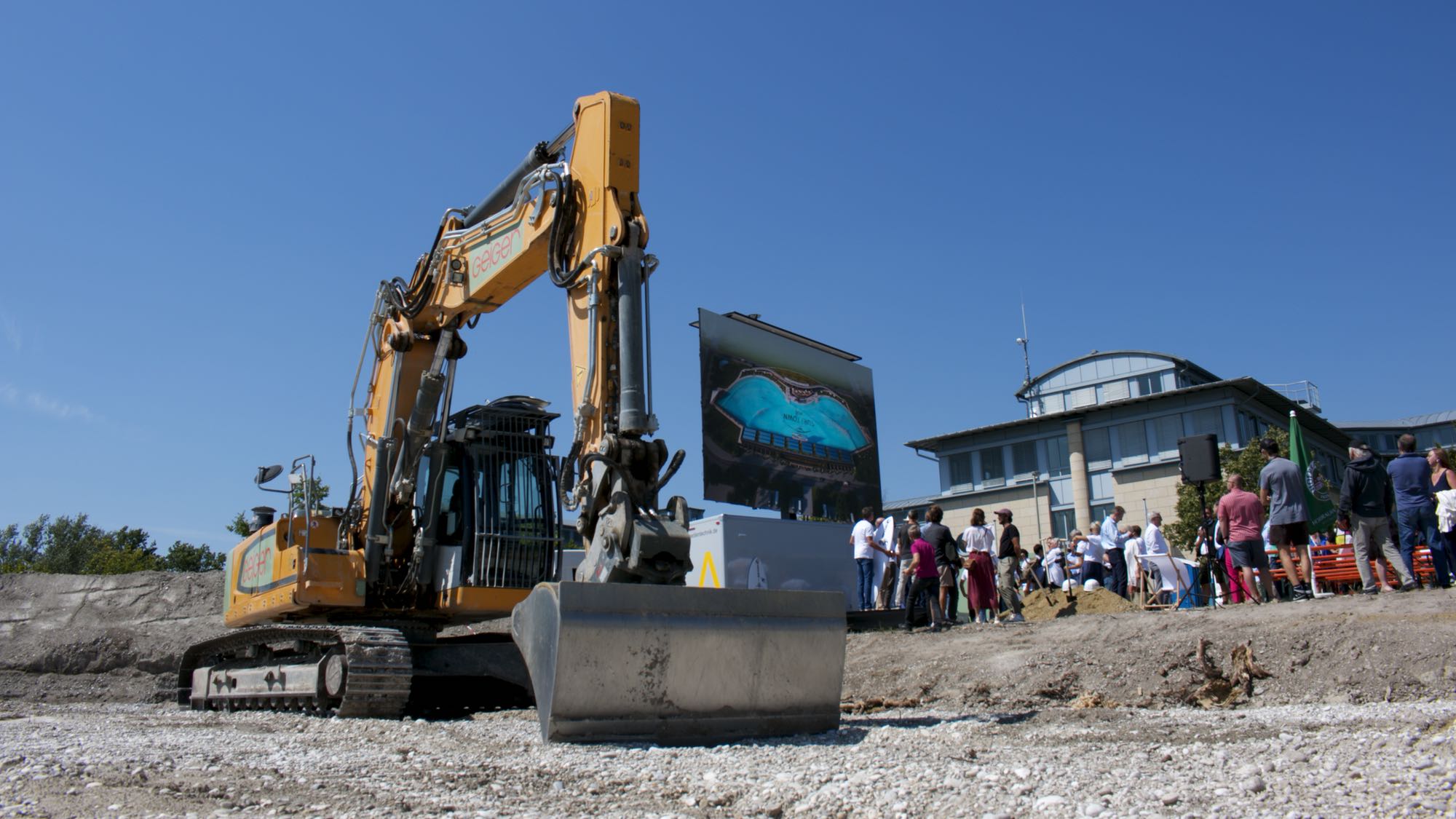
I spent several days in Munich surrounding the groundbreaking of the new Endless Surf powered facility dubbed Surftown MUC. What I saw around town was truly eye-opening: bikes kitted out with board racks, wetsuits hanging from balconies, the odd surf shop and surfers cycling (traffic is gnarly here) to the Eisbach River wave. One afternoon sitting at a Biergarten I struck up a conversation with a brother/sister duo who had just returned from an extended surf trip to Puerto Escondido. It was one of three trips they would take this year.
This was surprising because the common belief is that there are just a handful of dedicated river surfers here in Bavaria. It’s understandable, given a professional tour, three independent surfboard labels and a platter of surf brands dedicated to that wave. But the rapid surfers are just a sliver of the Bavarian surf scene.
“Everybody knows Eisbach but nobody knows about the strong core community and the expanding scene around Munich,” said Sebastian Gogle, editor of Prime Surfing Magazine. “You have the Eisbach and other standing waves but most surfers travel to the coast and around the world to go surfing.”
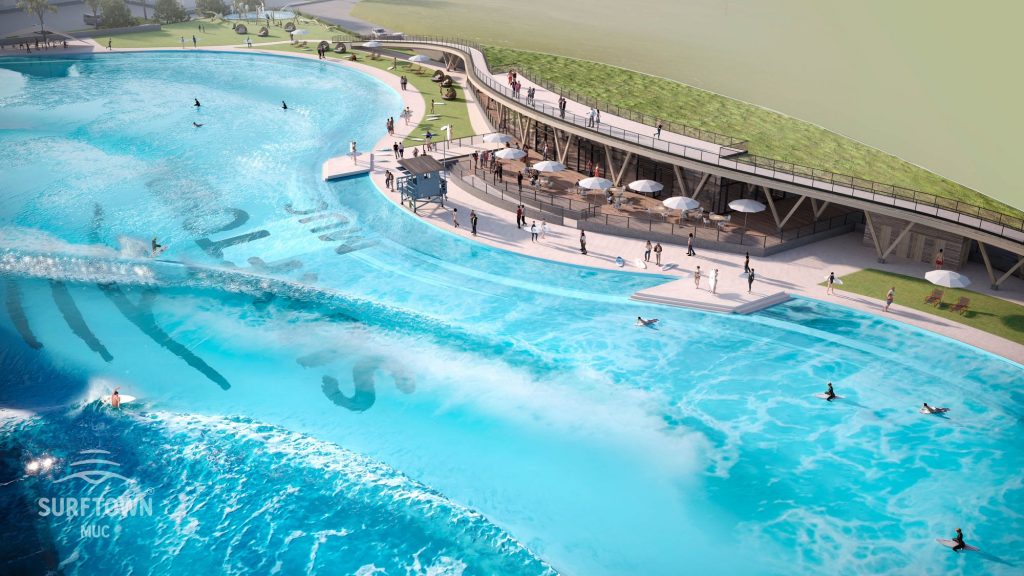
Recently in Hallbergmoos, an office park town under the flight paths at Munich International Airport (MUC), city dignitaries, developers, wave tech nerds and local rippers perspired in the midday sun to witness the groundbreaking at Surftown MUC. It was a significant moment, not only for the European wave pool scene but also for the legions of dedicated surfers in Germany.
“The wave pool will be great because now Munich surfers can jump on a city train out of downtown for a session at Surftown,” added Sebastien. “This will affect the level of surfing in Munich and in the larger scope, Germany. It’s a game changer.”
Internetland says there are 400K surfers in Germany, but Sebastian says there are likely more. One thing for certain is that, as Germany’s first wave pool, the Surftown project will have a profound effect here.
Here’s how it’s playing out…
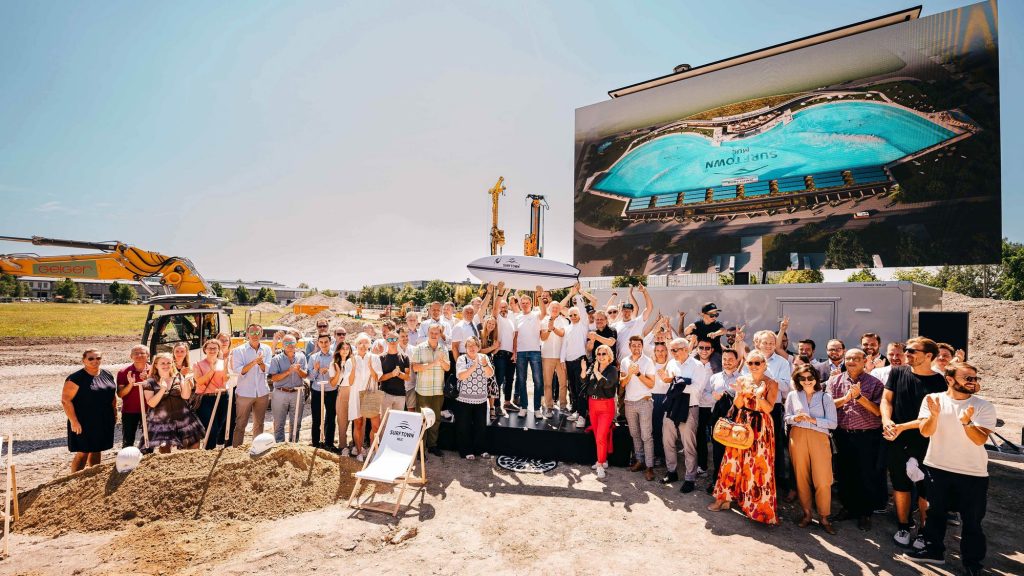
The construction of Surftown MUC was announced to the public last year and pegged as Europe’s largest surf pool. Since then, the developers have tackled a plethora of structural and technical requirements, working in close cooperation with the local and federal authorities, to get the job done.
On the task list is to create a surf park using sustainable concepts and create a facility that is climate-neutral and focuses on renewable energy along with water-saving measures. To achieve this, 90 percent of the wave tank and surrounding amenities will be powered by photovoltaic systems on-site with the rest of the utilities coming from purchased green energy. Locally abundant and heavily filtered groundwater will fill and replenish the pool.
The new surf site is close to the Munich Airport at Lilienthalstrasse 12 in Hallbergmoos, and slated to test operations in late 2023 with the official public opening happening in the spring of 2024.
“We are thrilled and proud to get closer each day to our dream of surfing near Munich”, said Chris Boehm- Tettelbach, CEO of Surftown MUC. “My sincere thanks goes to the municipality of Hallbergmoos, which has accepted the challenges of our forward-thinking project with remarkable pioneering spirit.”
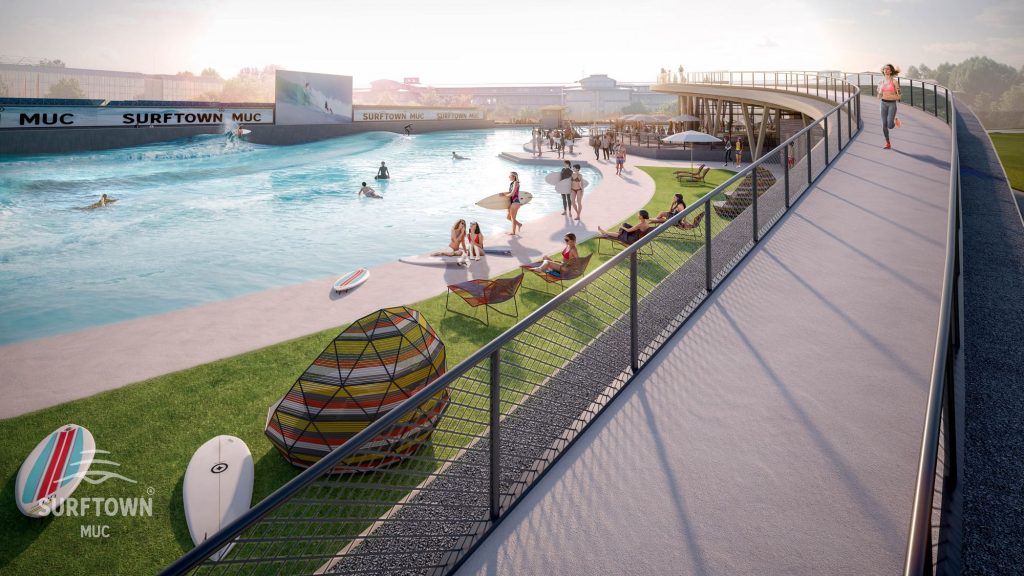
What can we expect?
The surf lagoon is 180 meters (200 yards) long and uses software to sequence waves from its 36 pneumatic chambers. Most notably, Endless Surf can produce a peeling wave along the entire length of the pool to offer a 20-second ride on this size pool. You can read more about the Endless Surf system here.
Stylistically, the surrounding buildings will tap the water theme with designs reminiscent of the shape of a breaking wave. The facility will also host an outdoor fitness area, a children’s playground, and a beach with facilities to hang out and relax.
Surftown MUC resembles Urbnsurf Melbourne, The Wave Bristol and Waco Surf – all stand-alone surf parks with a turnstile business model. This is the standard in the wave pool space at the moment. However, many of the current wave pool projects on the books globally are $200-$500 Million private housing developments with a surf pool as the star attraction – these developments do not have to sell tickets, just condos.
The Surftown MUC developers said they wanted to create a meeting place for the region attracting everyone from area workers on their lunch break to visitors on an international stop-over at the MUC airport a kilometer away. In short, they want to create community.
Next to the surf park, developer Rock Capital Group is building the Hybrid One lifestyle quarter. Unique to Europe, it will feature a central boulevard, showrooms, restaurants, and retail as well as ultra-modern and flexible office and workspace. The company said the goal is to redefine leisure and work on 30,000 square meters and will be completed in 2025.
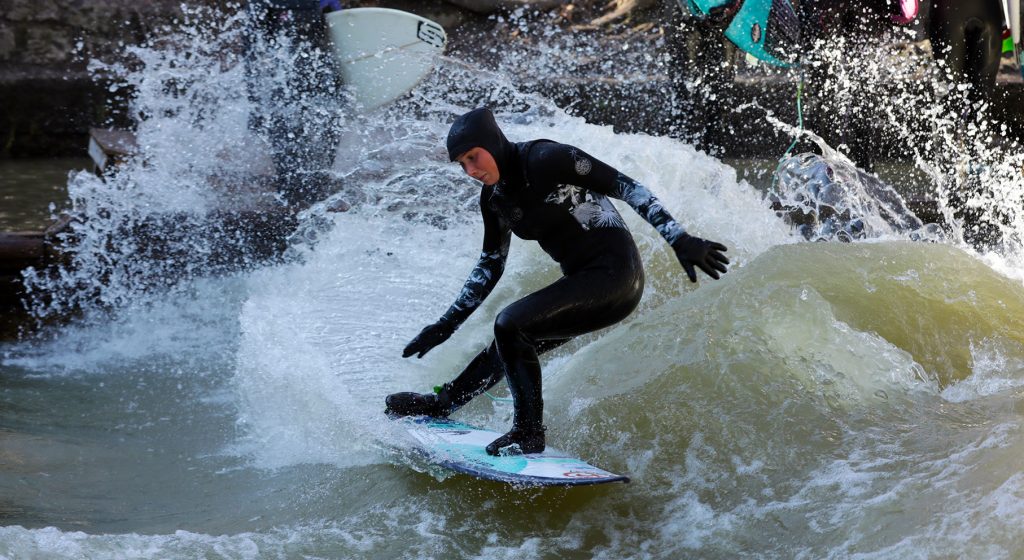
But it is the subject of having reliable surf via a wave pool that everyone is focused on at the moment.
“Bringing customizable waves to an already vibrant surf community surrounding the Eisbach River will surely solidify Munich as a surfing hub for Germany and beyond,” said Paul Chutter, President of Endless Surf and WhiteWater. “We’re incredibly honored to contribute to this rich surf culture alongside the dynamic team behind Surftown MUC.”
Mr Chutter’s quote echoes how the Munich surf scene is framed across the globe – one that too often relies on the Eisbach and other nearby rivers to exist. But after spending time in Munich this past week and meeting several locals, I see that framework only contains half of the German surf story.
A surfer from California doesn’t have to prove themselves as a devotee, it’s just assumed that they hit their local spot whenever and however they can. Waves are plentiful. Explain being a German surfer to outsiders from established surf cultures and it gets confusing. We will ask: “are you a river surfer or an ocean surfer?” On this trip I met surfers who only do river or ocean surfing (taking several trips per year). However, the majority do a combination of both.
To help ocean surfers there is a proliferation of entities like Pure Surf Camps that cater to stoked yet landlocked surfers. The group runs tour buses out to the coastlines of Europe and guests can book weeklong lessons complete with camping and coaching. The more advanced surfers solo camp on the beaches of Portugal, Spain and France for extended periods surfing daily regardless of conditions. For surfers in northern cities like Hamburg, the wind-torn peaks of the North Sea are an hour-and-a-half away by car. Despite their closer proximity to the ocean, it still seems like Munich is the heart of German surfing.
“Munich is a surf market already, in a way, through the rapid surfing scene, which has been here for a long time,” said Michi Mohr, Surftown MUC’s Chief Surfing Officer. “I know nearly everyone who surfs here hits the rapid wave pool at Johan Schweitzer or the Eisbach. But all those surfers are traveling a lot to surf real waves in the ocean, like, 2-3 trips per year. But sometimes, I mean, you go somewhere for two weeks, and maybe you don’t get a good swell or whatever. But I see surfing this wave pool as a weekly occurrence for many. And this will dramatically change surfing in Germany.”
Related Coverage
